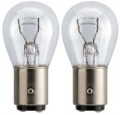Brightness
Luminous flux produced by a car lamp; for dual-mode models like bi-xenon (see “Type”), the value at maximum brightness is indicated.
This parameter characterizes the actual brightness and efficiency of the lamp; it can be used to directly evaluate and compare different models, regardless of their type and power consumption (but only at the same color temperature - see below for more details). The brightest are headlight lamps (see “Purpose”), in them this indicator can
exceed 4000 lm and vary noticeably from model to model. Therefore, when choosing such a lamp, you should pay special attention to the characteristics of the luminous flux. It should be borne in mind that too bright headlights are just as undesirable as too dim ones: high brightness creates not only the risk of dazzling for oncoming cars, but also discomfort for the driver himself. Optimal luminous flux values can be indicated in the documents for the car or for the headlight itself; if such data is not available, you can turn to other special sources.
As for other types of lamps, in models for auxiliary lighting the luminous flux is up to 800 lm, and in lamps for the instrument panel - up to 55 lm. Moreover, in both cases, the brightness is selected by the manufacturer taking into account the specific specialization and location of the lamp, so in such models this parameter is not a key one.
Lifespan B3
Guaranteed lamp life according to B3 standard. In fact, this is the longest time that the lamp can continuously work with a 97% guarantee (it is impossible to provide a 100% guarantee in principle). This parameter is measured as follows: a test batch of lamps is used until 3% of them fail, the resulting time is indicated in the characteristics.
Other things being equal, longer-lasting lamps naturally cost more, but longer service life compensates for this disadvantage. Separately, we note that you should not confuse the guaranteed service life with the manufacturer's warranty — the conditions and warranty period may be different even for lamps with the same B3.
Lifespan Tc
The maximum continuous lamp operation time. This indicator is quite approximate and the probability that the lamp will work during this period is approximately 1 in 3. This is due to the measurement technique: a control batch of lamps is used until 63.2% of them fail, the resulting time and indicated as "maximum service life". However, the Tc data compared to the B3 guaranteed life (see above) provides a good estimate of the overall lamp life and its ability to last beyond the guaranteed life.
Increased brightness
The level of increased brightness provided by the lamp. This indicator is used by some manufacturers for marketing purposes: it describes how brighter a given model is than some "standard lamps". At the same time, the standards for comparison may be different, and impressive figures (in some models reaching 140%, that is, almost 2.5 times) are not always reliable — that is, a high-brightness lamp will not necessarily be just that much brighter than the “normal” model of the same type and power.

